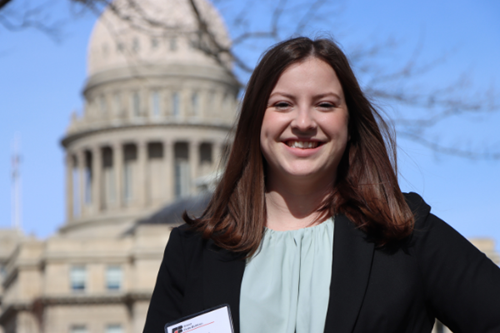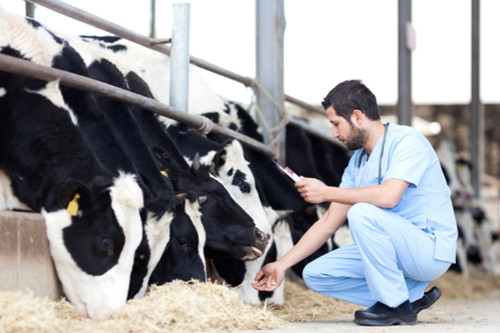"The right to defy an unconstitutional statute is basic in our scheme. Even when an ordinance requires a permit to make a speech, to deliver a sermon, to picket, to parade, or to assemble, it need not be honored when it's invalid on its face." - U. S. Supreme Court Justice Potter Stewart in Walker v. Birmingham, 1967
By: Idaho Farm Bureau Governmental Affairs
Two Tax Measures Advance
 BOISE- This week two bills that have previously been approved in the House of Representatives were approved in the Senate Local Government and Taxation Committee, chaired by Senator Jim Rice (R-Caldwell).
BOISE- This week two bills that have previously been approved in the House of Representatives were approved in the Senate Local Government and Taxation Committee, chaired by Senator Jim Rice (R-Caldwell).
H575 takes a small, yet important step forward in closing a statutory loophole which is currently allowing local governments to incur long-term debt for a jail or courthouse without a vote of the people.
The Idaho Constitution, Article VIII, Section 3 is very clear that local governments and other taxing districts are not allowed to obligate the taxpayers to long-term debt without a 2/3 majority vote of the people.
Unfortunately, the Idaho Supreme Court ruled a while ago that a long-term lease does not trigger the constitutional requirement for a vote. H575 simply takes a step in getting back to the spirit of the Idaho Constitution by requiring any lease of a courthouse or jail of five years or longer to be approved by a simple majority vote of the people in the district.
H575 recognizes that long-term debt has the same effect on taxpayers regardless of whether it is structured as a lease or a bond. Taxpayers want to have more input into their tax obligations, not less. Farm Bureau policy states: “We oppose circumventing the required 2/3 majority vote by creative financing options.” H575 is a good step in that direction. IFBF appreciates Rep Bruce Skaug (R-Nampa) for his efforts in sponsoring H575. IFBF policy #92 supports H575.
H673 ensures that local taxing district budgets do not grow more than is necessary when new growth occurs in the taxing district. Taxing district budgets can grow by up to 3% each year, plus they can add the value of any new construction to their budgets. The idea is that when new buildings are constructed, the local governments will be extending services to new locations, which will cost additional money. Therefore, their budgets are allowed to grow to provide the services.
However, sometime over the years, the change in the value of land was added into the definition of new construction. This has allowed taxing district budgets to grow faster than necessary since they were able to grow the budget by the value of the new building, plus the change in the value of the land. H673 simply removes the ability to add the value of the land to the budget so it does not grow as quickly.
H673 does not change the amount of tax that is collected from any property. It only affects the ability of budgets to grow when the value of land changes due to new construction. IFBF appreciates Senator Jim Guthrie (R-McCammon) for his efforts in sponsoring H673. IFBF policy #80 supports H673.
Idaho Farm Bureau Internships
 BOISE- My name is Emily Blattner, and I am from Kuna, Idaho. I am studying for a B.S. in Political Science and minoring in Agricultural Science, Communications, and Leadership. I worked at the Idaho Wool Growers Association over the 2021 summer and the director, Liz Wilder, mentioned that I should look into the legislative internship with the Idaho Farm Bureau.
BOISE- My name is Emily Blattner, and I am from Kuna, Idaho. I am studying for a B.S. in Political Science and minoring in Agricultural Science, Communications, and Leadership. I worked at the Idaho Wool Growers Association over the 2021 summer and the director, Liz Wilder, mentioned that I should look into the legislative internship with the Idaho Farm Bureau.
Participating in this internship has been a fantastic experience and has given me the opportunity to have an in-depth look at a potential future career for me. I met with agricultural industry leaders, Senators, and Representatives throughout the week. I learned more about the legislative process by sitting in on committee meetings and watching the House and Senate on the Floor. I was shown how to read a bill and to understand the logistics of a bill under review. I followed Russ into meetings with Legislators and got to see the background work that a lobbyist does. I went to committee meetings with Chyla and Braden and got to see Chyla testify towards a bill. I thought it was interesting how every day there was always something new to do or learn.
I enjoyed the experience of studying what happens in the legislature and agricultural issues. Political knowledge is critical for members of the ag industry, and it is important to learn more about the current political issues and legislation that is happening. Learning more about the Idaho Farm Bureau and what it does for farmers, ranchers, and anyone within the agricultural industry was eye-opening. The Farm Bureau wants what is best for its people and will go at length to make sure that new policies positively affect the ag industry. I am so glad that I took the opportunity to do this internship. I would recommend anyone who has an interest in public policy, politics, the agricultural industry, law, and lobbying. - Emily Blattner
 BOISE- Hello! My name is Jamie Zimmers, and I am from Castleford, Idaho. I am currently studying Political Science and Economics at the University of Idaho and intending to attend law school after my undergrad. This week I got the opportunity to intern with the Idaho Farm Bureau Federation Governmental Affairs Division at the Capitol to see firsthand how Idaho’s legislature works.
BOISE- Hello! My name is Jamie Zimmers, and I am from Castleford, Idaho. I am currently studying Political Science and Economics at the University of Idaho and intending to attend law school after my undergrad. This week I got the opportunity to intern with the Idaho Farm Bureau Federation Governmental Affairs Division at the Capitol to see firsthand how Idaho’s legislature works.
Throughout the week I was able to watch the House and Senate on the Floor debate bills, listen in on committees, and watch Russ testify in favor of a bill. This opportunity has taught me the full process of how a bill becomes a law. Before attending this internship program, I did not fully understand the depths that lobbyists go into drafting a bill and how much knowledge the legislature needs to have before the bill goes into a committee. My experiences because of this internship will be extremely beneficial in the future because it will allow me to have knowledge about how a bill becomes a law, the drafting process of a bill, and researching information to create a bill. I also learned about networking, speaking or testifying in front of a committee, and how essential an attorney is for governmental affairs.
I would recommend the internship program to anyone wanting to gain state legislative experience. The IFBF team was wonderful to work with. They were dedicated to answering all of my questions, no matter how minuscule my question was. This week has been invaluable to me. I will carry this experience and a deeper understanding of the state legislature for the rest of my life. – Jamie Zimmers
Vet Bill Clears the Senate
 BOSIE- On Monday, the full Senate debated and voted on S1380, a proposed veterinarian loan repayment program. After the lengthy debate, the bill passed on a vote of 28 to 7. The bill now heads to the House Ag Affairs Committee for consideration.
BOSIE- On Monday, the full Senate debated and voted on S1380, a proposed veterinarian loan repayment program. After the lengthy debate, the bill passed on a vote of 28 to 7. The bill now heads to the House Ag Affairs Committee for consideration.
For those interested in providing testimony in support of the legislation, consider sending letters to the committee secretary at hagri@house.idaho.gov. Individuals are also welcome to testify in person or remotely. The meeting will be held next Tuesday, March 22, at the Capitol in EW 42 at 1:30 p.m. If you desire to testify remotely, please send an email to the committee secretary letting her know in advance of your desire to participate remotely.
As a quick recap of what the bill proposes, S1380 would create the “Rural Veterinarian Loan Repayment Program.” Money allocated to the program would pay education debts for veterinarians committing to provide care primarily to agriculture production animals in rural areas of the state. The bill establishes a payment cap of $25,000 per year up to a maximum of $75,000 per qualified applicant, with a commitment to work for 4 years in the state. If a recipient fails to abide by the contract, the grant award amount of the last year would have to be paid back. Any candidate already receiving another loan repayment award would be excluded from participating in this program. The legislation would also allow for private donations and federal funding to be contributed to the program. To oversee the distribution and allocation of funding, a five-member advisory committee would be established in ISDA.
IFBF Policy #111 supports efforts to incentivize vet students studying large food animal medicine to practice in Idaho. IFBF supports S1380.
Water Infrastructure Investment Update
 BOISE- The bill that appropriates funding for large water infrastructure projects has passed the House. H769, the funding bill for the Idaho Department of Water Resources, passed on a 59 to 10 vote and will soon be considered in the Senate.
BOISE- The bill that appropriates funding for large water infrastructure projects has passed the House. H769, the funding bill for the Idaho Department of Water Resources, passed on a 59 to 10 vote and will soon be considered in the Senate.
The bill essentially follows the Governor’s budget recommendation for the agency, including $75 million of one-time funding from the state general fund, and $250 million from the state’s ARPA funding. U.S. Treasury guidance limits the types of projects that ARPA dollars can be used for; nonetheless, several of the already identified large water projects in the state, such as the Anderson Ranch Dam raise, the Mountain Home Airforce Base drinking water project, and upper valley ESPA recharge projects, would all qualify for funding use. This will allow the IWRB to stretch the remaining dollars to fund other important projects.
The bill directs the Idaho Water Resource Board to develop criteria for the expenditure of money for projects that prioritize the public benefit. Specific factors for consideration should include the protection of existing water rights, hydropower, future development needs, maintenance of aging water storage and delivery infrastructure.
Farm Bureau policy supports such investments in the state’s water infrastructure, and we are anxious to see these new appropriated dollars be put to good use.
CDL Bill Headed to Governor’s Desk
 BOISE- The Senate passed H525 on the floor with a 33-0-2 vote. Now that it has passed both chambers it is headed to the Governor’s desk to be signed into law.
BOISE- The Senate passed H525 on the floor with a 33-0-2 vote. Now that it has passed both chambers it is headed to the Governor’s desk to be signed into law.
H525 extends the time in which a Commercial Learner’s Permit expires from 180 days to one year. This bill was brought by the Idaho Transportation Department (ITD) to help cut back on a cumbersome regulation, which in turn hopefully will make it easier and will encourage folks to get their CDL driver’s certification. By extending the Learner’s Permit expiration to one year, the individual will have more time to practice under the permit before taking the required skills test for the CDL. It will also help save time and money as the individual does not need to go into the DMV and pay to extend their permit every 180 days, as previously required.
Farm Bureau has many members that rely heavily on CDL drivers to get work done for their operations, and to also get their commodities to market and consumers. It is no surprise that there is a shortage of labor in every industry right now, and the trucking industry is no exception. It is imperative to our members that we have readily available, trained CDL drivers in the state to help fill these necessary positions.
IFBF has policy that supports reviewing existing regulations to determine their effectiveness. ITD has done excellent work by flagging this regulation as ineffective and unnecessary. A one-year period for a Commercial Learner’s Permit saves time and money for individuals and helps us expand the pool of confident, trained CDL drivers.
IFBF Policy #139 supports H525.
Still can't find what you are looking for? Find by topic:
- Achievement Award (YF&R)
- Actions Alerts
- Advocacy
- Ag Ambassadors
- American Farm Bureau
- American Farm Bureau Policy Book
- Archive Photos
- Articles
- Board of Directors
- Calendar - State/District
- Calendar - County
- Capitol Reflections
- Collegiate Chapters
- Committee Application Form
- Commodities
- Convention Annual
- County Presidents & Board Information
- County Resource Page
- Delegate Form
- Discount Programs
- Discussion Meet
- Discussion Meet - High School
- Education Programs
- Events
- Excellence Award (YF&R)
- Expense Voucher
- Flickr
- Gem State Producer
- High School Discussion Meet
- High School Speech Contest
- Hope in Idaho Ag
- House of Delegates Credentials Form
- IFBF Board of Directors
- IFBF Policy Book
- IFBF Staff
- Insurance
- Legislative Action Program
- Legislative Issues
- Library
- MAC Trailer
- Magazines
- Map My Benefits
- Member Benefits
- Member Discount
- Membership Application
- Mental Health Resources
- Mission Statement
- Moving Agriculture to the Classroom
- Newsletter Sign up
- News Releases
- News Room
- Open Range Law
- Podcast
- Policy Book American Farm Bureau
- Policy Book IFBF
- Postcard Order
- Promotion & Education
- Range - Open Range Law
- Quarterly
- Registration for Events
- Scholarship Application
- School Trailer
- Social Media
- Speech Contest
- Staff IFBF
- Ticket Sales Portal
- Videos
- What is IFBF
- Young Farmers & Ranchers Program
- Youtube

